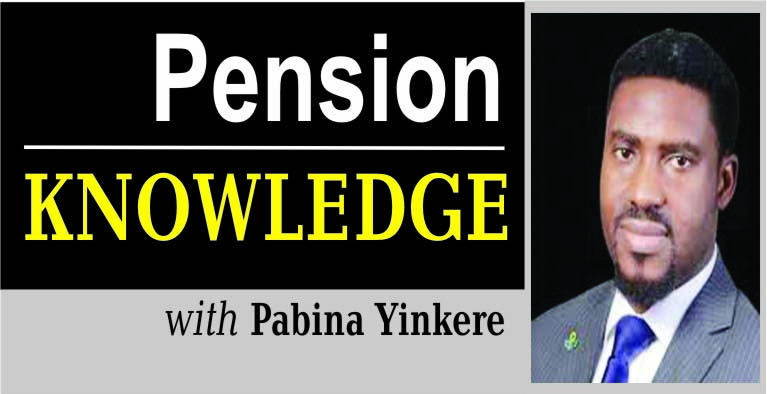
In the last edition of this series, a clear path for this awesome and beneficial journey was provided. Being a journey, it is natural that participants would commence theirs at different times. Whilst some participants would have arrived, the retirees and the deceased in this instance, the journey continues for those who are still in employment. For others, students, those waiting to secure employment or start their own business, the journey is yet to commence. In the journey of life, nothing is so certain and reassuring when the outcome of endeavour is already determined. It is akin to watching a repeat play of football match that you already know the outcome. This is exactly the journey of the Nigerian pension industry.
Quite a lot had been said about this journey without mention of the stakeholders. These institutions and individuals, I think, deserve some applause.
• The National Pension Commission (PenCom)
• The Pension Fund Administrators (PFAs)
• The Pension Fund Custodians (PFCs):
Besides the trio of the PenCom, PFAs and PFCs, other parties play crucial role in the administration of the scheme. They include:
READ ALSOFG receives India’s 100,000 doses of Covishield vaccines
• The employers of Labour. Their major role is the deduction of pension portion from the employees’ salaries, contribution of their portion and remittance of these pensions (employees and employers) portions to the PFAs through a PFC. To ensure prompt remittances of pension deductions by employers, the Act provides that employers should remit pension deductions not later than seven working days from the day the employee is paid his/her salary. Employers are also liable to penalty for failure to make such remittances on behalf of their employees. This penalty shall not be less than 2% of the amount of pension deductions not remitted by the employer.
• Employees: These are the workers employed by organisations. Employees become Retirement Savings Account (RSA) Holders when they are issued Personal Identification Number (PIN) by PenCom. The employees are the reason for the enactment of this Act and they have a major role to play in the working of the scheme.
The Next-of-Kin (NOK) of an RSA Holder is an important stakeholder and this is in the event of death of an RSA Holder. Payment of death benefits are done on the basis of a Will admitted to probate or Letter of Administration (LOA). Where the RSA Holder died intestate (without a will), the named NOK is required to process LOA with Probate Registry. This is needed for death benefits to be paid to the Administrator of the deceased estate.
The Act recognises two payment options when RSA Holders retire under the scheme. These are the Programmed Withdrawal managed by the PFAs and Annuity managed by Insurers licensed by the National Insurance Commission (NAICOM).
This journey has come with tremendous benefits. A few of the benefits are as summarized below:
Pension funds increase liquidity in the economy; provides long term capital, capable of promoting economic growth and infrastructure development. Pension funds constitute a huge investment fund in the capital and money markets. The scheme has also created employment opportunities.
Being a defined Contribution Scheme, the employer’s liability is limited to the amount of pension remittances due to the employee as long as he/she is in employment of the employer. There is no investment risk on the employer and no sort of actuarial valuation of the scheme.
For the employees who are the focus of the scheme, the benefits are unquantifiable. Huge savings are being accumulated and this is not just the employees’ contributions, but also the employers’ contributions. There is also a window for Additional voluntary contributions to argument such savings and this comes with decent tax savings on the employees’ salaries. One way to appreciate this scheme is to check your RSA balance and assume there was no PRA, the question is would you have been able to save so much? Just hold unto the response. The architect of the scheme are so thoughtful and looked beyond the employees in the event of death. So, employers are mandated to take Group Life Insurance policy which is three times the annual gross salary (Basic, Transport and Housing) of the employees. This benefit is paid to the employees’named beneficiary in line with provisions of the Insurance Act. How about the prompt payment of monthly pensions to the Retirees? On or before 24th of the month, Retirees bank accounts are credited with the amount of the agreed pension. It sounds so good that one looks up to retirement with excitement. Do not ask me how it was before the commencement of this journey.The employees also enjoy a lot of investment diversification as their pension contributions are invested in government securities, corporate debts securities, supra-national Bonds/Sukuk, money market instruments, ordinary shares including infrastructure funds, private equity funds and open, close-end and hybrid funds. These are instruments a good number of the employees would not have been able to invest in due to the amount required for such investments and their complexities. Isn’t it interesting? Are we not proud to be part of this endeavour? For the few who are yet to embrace this scheme, I enjoin you to come on board.
The post The Nigerian Pension Industry – A journey with definite destination (2) appeared first on Vanguard News.



![[MIXTAPE] Dj Deen - Classic Rhyhems](https://blogger.googleusercontent.com/img/a/AVvXsEhrYhxlaBWoArtWMpNm225nK-9wBhrw3cQ_59b7c5zZvdx1pnhPurDz1NJhn7Zgax4yLpljP2s_983XQFcZcskyUYl0gNRB1flkedUPEDODWbSlvdVhmdo9JxmElNUQy4o38CfWwVkiK2hFKpN5u7U2d84sXV-HN5tFMqD0Cv9cLFqC6B5wWRF4ubp-=w680)
![[Music] Jakhada - Kana Nan](https://blogger.googleusercontent.com/img/a/AVvXsEjyq50Q27kdxKlzTRdQ2Q2MIDV_loiuSwAA853p27nk6EG4-whzhZ73Y3FvJwm40mrVqqWFhbMR6izOrlXpyhv_Drh5mgMJaJaqvnURqcKye_dDfkLm1q5qI-NUGaIQKJLVJb6vcVmLwe7tcEyFD-AVAF3465k9dIbughUqo9JUWvg7IeOYrLhRMf0isA=w680)
![[Video Skit] Skelevalency -Tell ichie to leave me](https://blogger.googleusercontent.com/img/a/AVvXsEjmG7Wl_4XVI78hdj5MzSppE7WL04gpgSFZn8DLQt8cZ2Fjjfzxrqocmn8DBlJEJiyP3rboZshGzbYXTeUJMnGeTJoLJDTvcMxx-w8ZtfX5exeYQuBW5LYw_Q7WEYRJcH0QP3NH12P15g4fvZajNejqhSNlmb1HneOuzqHsZgzrl25yrF_4s2EFxgixqg=w680)



![#BBNaija: Man behind Big Brother’s voice finally shows his face [Video]](https://1.bp.blogspot.com/-5YubWO7KWRE/YVOJnnIByNI/AAAAAAAAEfs/SE8a_zdPx-UbiZNUiSfbrm0ME81BuHFWACLcBGAsYHQ/w680/big-brother.x25186%2B-%2Bnaijamedialog.jpg)
![[Music] 2Much - MPA WIRE WIRE](https://blogger.googleusercontent.com/img/a/AVvXsEj-R6AbZ6QuFHrVKm6KSuIb8M0wjEH_KQOAguAMPxxw587s6AYRgkvaRIKJ06xGJs726r0u7j1LJfKs1emAlodRJ0sOWO3qtcfTDPF7vmHa0H-5VuFAnaL8K0fRaMtg5OT0VdPFeIV3S7WzOz7H0FTmhEs1RwApTWnGJ4hSkhzs2ySqzFzgi9g6vWcEuw=w680)







Advertise your business here at cheap rate and get large audience to your market. Call/Msg Teemikemedia: 07060733664 to get started.